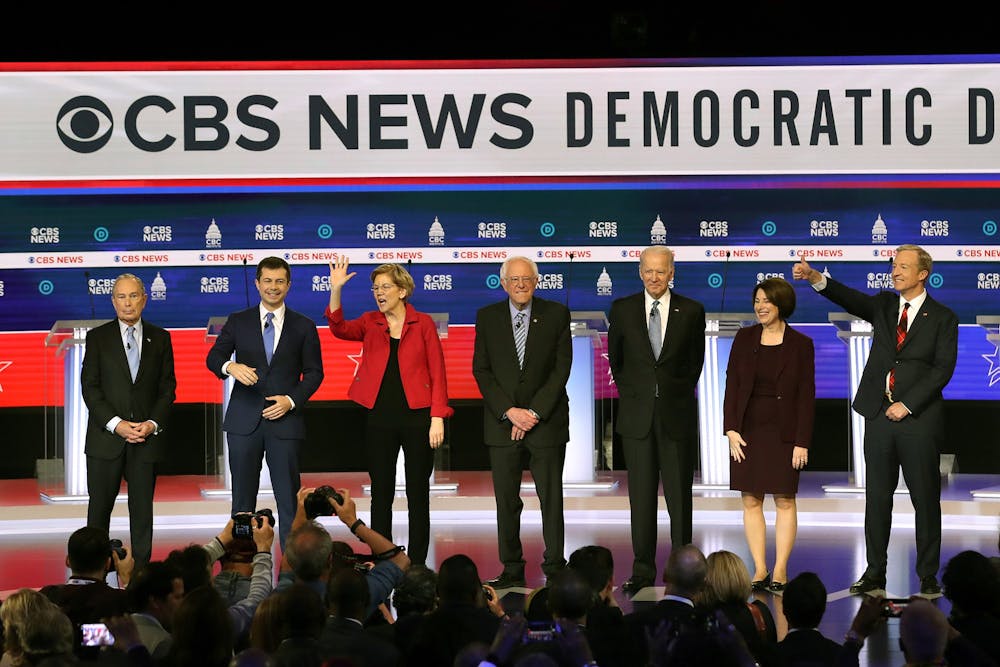With former Vice President Joe Biden's decisive victory in the South Carolina primary on Saturday and former Mayor Pete Buttigieg dropping out of the race on Sunday, it is looking increasingly likely that no Democratic candidate for president will receieve a majority of pledged delegates. Data journalism website FiveThirtyEight estimates the likelihood of no one having a majority is 64%.
The candidates were asked at last month's Nevada debate whether the person with the most delegates should win the Democratic nomination even if they are short of a majority.
All but one of the candidates came out against democracy.
Sen. Bernie Sanders, I-Vt., was the only candidate to say no. Sanders’ reasoning was that superdelegates, which are on the second ballot at the party convention, are undemocratic and that the popular vote alone should determine the party’s nominee.
This question brought to light how problematic the delegate system is in party primaries, especially for outsider candidates like Sanders who go against conventional political wisdom.
At its core, the delegate system is undemocratic. Having party representatives vote for their constituents only provides an unnecessary middleman to obstruct the will of the voters and uphold the desires of party leaders.
In the Democratic primary there are two kinds of delegates: pledged delegates and unpledged superdelegates.
A pledged delegate is a person chosen through a primary or caucus to vote on behalf of their constituents. They are bound by the popular vote and are dispersed proportionally. For example, if a candidate wins 40% of the popular vote in a state that offers 10 delegates, they will win four delegates.
Superdelegates, on the other hand, are mostly high-level party officials. They were created in 1982 and are either members of the national party organization, elected officials or distinguished party leaders. They are also unpledged, meaning they are not obligated in any way to vote in line with the voters.
If superdelegates so choose, they could stray away completely from the will of the people, voting for the candidate they prefer regardless of who is most popular. This is because they are not beholden to their constituents’ popular vote in any way, unlike pledged delegates.
Superdelegates only make up 16% of the total delegate count. Giving such a small number of elites the power to determine the outcome of the primary election is absurd.
Fortunately for the 2020 Democratic primary, superdelegates are banned from the first ballot at the national convention. However, if no candidate receives over 50% of the pledged delegates on the first ballot, then superdelegates vote for the nominee on the second, potentially being extremely problematic.
Having a clear majority on the first ballot is unlikely if more candidates are in the race. If the race goes to a second ballot at the Democratic National Convention, there is a near guarantee that party elites will override the popular vote. We must preserve the integrity of our democracy and allow the candidate with the most votes to win the nomination.
It wasn’t long ago, following the 2016 presidential election, that Democrats were screaming at the top of their lungs to abolish the electoral college. Party delegates pose the same problem that the electoral college does.
Just like party delegates, the Electoral College electors are often state elected officials or state party leaders. Party insiders and representatives are disenfranchising the impact of individual voters. We need to uphold one person, one vote.
The problem is that Sanders and other anti-establishment candidates are incredibly unlikely to court superdelegates because they are mostly high-up party leaders in the Democratic establishment who would be reluctant to favor certain economically populist policies such as "Medicare for All" or tuition-free public college.
We already know the 2016 Democratic primary was rigged against Sanders, following the release of DNC emails by WikiLeaks. This election, if Sanders only has a plurality on the first ballot, the superdelegates could still change the outcome of the primary on the second — and the American people should not take this lying down.
If superdelegates are able to steal this election from the voters, there will be riots at the Democratic National Convention in Milwaukee, Wisconsin, in July — likely far worse than the 2016 DNC riots.
As former DNC chairwoman Debbie Wasserman Schultz said in a 2016 interview with CNN, “Unpledged delegates exist really to make sure that party leaders and elected officials don't have to be in a position where they are running against grassroots activists.”
We need to do away with delegates. They only serve as another way to disenfranchise and discourage voters and to shut out grassroots activism. The only metric we should use to elect or nominate candidates is the popular vote because that is what is most democratic.
Jonah Hyatt (he/him) is a junior studying political science and philosophy. He is the treasurer of the Palestine Solidarity Committee at IU.






